|
|
|
Sort Order |
|
|
|
Items / Page
|
|
|
|
|
|
|
| Srl | Item |
| 1 |
ID:
116678


|
|
|
|
|
| Publication |
2012.
|
| Summary/Abstract |
Despite the significant level of cultural diversity that exists in contemporary Europe as a consequence of immigration and diaspora, state policies on multiculturalism in several countries have not kept pace with the complex and dynamic processes created by these pluralising social forces and realities. This has given rise to exclusionary contexts that have led to feelings of alienation by immigrant communities. In Britain, the violent street confrontations in Bradford in 2001 and the London bombings of 2005 both epitomised, as well as were outcomes of, the British nation state's failure to foster dialogue and a sense of inclusion among these communities. Foregrounding the extent of the grievances and frustrations prevalent in British society, these social disturbances have also contributed to renewed debates on issues of national identity, belonging, and multiculturalism. More importantly, these clashes, involving mostly the second-generation British Asian Muslim community, have brought to the fore the dissonance between assumptions of belonging underlying "state multiculturalism", which moves to fix and stabilise identities, and those that inform the complex processes of identification and constructions of the "third space" of belonging by racialised minority communities. Focusing on Britain, this paper's central hypothesis is that official multiculturalism has failed to take into account the fluid and heterogeneous frames in and through which second-generation British Asians ground their cultural and political identities and demands. As many of the nation states in Europe are today, like Britain, multiethnic in composition with expanding Asian communities, how successfully or not Britain modifies its integration policies with respect to the presence of minorities of immigrant origin has enormous implications not only for Europe but also for Asia and Asia-Europe relations.
|
|
|
|
|
|
|
|
|
|
|
|
|
|
|
|
| 2 |
ID:
174821


|
|
|
|
|
| Summary/Abstract |
This article explores how the political connections cultivated by Pakistan’s business groups contributed to their rise as key actors in the corporate sector. Such connections have long been used by business groups in developing countries to secure access to economic rents from politicians in power. We examine the basis of selection of business groups for state patronage under military and civilian-led regimes, as well as the extent to which such ties have contributed to their rise as Pakistan’s leading enterprises. A historical analysis is provided of these groups, with a focus on a financial review of their publicly listed companies. We find that emerging business groups actively resort to rent-seeking activities by colluding with ruling elites, while also using multifaceted networking to protect and enhance their presence in the corporate sector.
|
|
|
|
|
|
|
|
|
|
|
|
|
|
|
|
| 3 |
ID:
047910
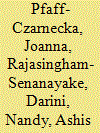

|
|
|
|
|
| Publication |
New Delhi, Sage Publications, 1999.
|
| Description |
209p.
|
| Standard Number |
8170368286
|
|
|
|
|
|
|
|
|
|
|
|
Copies: C:1/I:0,R:0,Q:0
Circulation
| Accession# | Call# | Current Location | Status | Policy | Location |
| 043829 | 305.80095/PFA 043829 | Main | On Shelf | General | |
|
|
|
|
| 4 |
ID:
089197


|
|
|
|
|
| Publication |
2009.
|
| Summary/Abstract |
Chinese family enterprises in the United Kingdom have penetrated many different sectors of the economy, including restaurants, wholesaling, retailing, trading, manufacturing, property development, computer services and investment holding. Among the companies in these sectors, those involved in different segments of the food industry, as manufacturers, retailers and wholesalers, reputedly feature characteristics of Chinese culture. A majority of these enterprises, for example, function as family firms. This study explores the assertion that, among companies owned by ethnic minorities, culture strongly influences form of business development. This argument will be assessed through a focus on Chinese food-based enterprises in the UK. Two family-controlled companies, Seven Seas (Frozen Food) Ltd and Dayat Foods Packaging Ltd, were selected as case studies as they are involved in key business components of the Chinese food chain industry. Through an in-depth comparative study of the history and development of these two firms, we consider the argument that Chinese businesses have evolved well because of family ties and their inclusion in mutually-beneficial ethnically-constructed networks. Through these case studies, we provide an alternative perspective to diasporic Chinese business development which brings into question the extensive use of the concept of ethnic enterprise.
|
|
|
|
|
|
|
|
|
|
|
|
|
|
|
|
| 5 |
ID:
078524
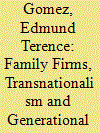

|
|
|
| 6 |
ID:
111582
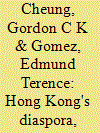

|
|
|
| 7 |
ID:
138823


|
|
|
|
|
| Summary/Abstract |
The articles in this special issue examine the interactions of religious, economic and political power by exploring the impact on multi-ethnic societies in Malaysia and Singapore of prominent non-mainstream Christian and Muslim groups whose significant business activities relate to their religious faith. A study of the enterprises developed by these groups provides insights into the importance of religion to their leaders and the groups they represent when initiating and operating these businesses. Because these enterprises are engaged in sustained contact with different publics, the question is raised whether they are implicated in proselytization and if this leads to social conflict resulting in fragmentation and polarization, or whether they can be a force for positive change in society by contributing to the resolution of social and economic problems. Moreover, state authorities concerned about rival centres of power find it difficult to ignore potent combinations of economic and religious influence, but both the development of these combinations and the political response to their existence owe much to the globalization of religious ideas, current economic orthodoxies and the Southeast Asian context.
|
|
|
|
|
|
|
|
|
|
|
|
|
|
|
|
| 8 |
ID:
048028
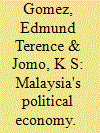

|
|
|
|
|
| Publication |
Cambridge, Cambridge University Press, 1997.
|
| Description |
xix, 207p.
|
| Standard Number |
0521599962
|
|
|
|
|
|
|
|
|
|
|
|
Copies: C:1/I:0,R:0,Q:0
Circulation
| Accession# | Call# | Current Location | Status | Policy | Location |
| 042378 | 338.9595/GOM 042378 | Main | On Shelf | General | |
|
|
|
|
| 9 |
ID:
118916
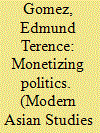

|
|
|
|
|
| Publication |
2012.
|
| Summary/Abstract |
This paper assesses the patterns of financing of political parties and elections in Malaysia. The poor regulation of the activities of parties and of all forms of political elections has contributed to allegations of covert funding of politicians, from both Malaysian and foreign sources. Since parties have grossly unequal access to funds, this has led to unfairness in federal and state elections. This paper also deals with two fundamental issues in the financing of politics. First, Malaysia is one of very few countries where parties own corporate enterprises, a trend known as 'political business'. Second, money-based factionalism, known as 'money politics', is threatening the existence of parties and undermining public confidence in government leaders. Party factionalism is based not on ideological differences but on which political leader has the greatest capacity to distribute funds to capture grassroots-level support. Two core issues contribute to the extensive monetization of politics. First, existing disclosure requirements do not adequately restrict the covert funding of politics or ensure electoral fair play. Second, public institutions that oversee electoral competition are not sufficiently autonomous to act without favour. Finally, this paper reviews the levels of transparency built into current legislation, the pattern of financing of parties and electoral campaigns, and the relevant regulatory bodies' institutional capacity to ensure fairness and accountability during elections. The paper proposes legislative and institutional reforms to ensure electoral fairness, within and between parties.
|
|
|
|
|
|
|
|
|
|
|
|
|
|
|
|
| 10 |
ID:
078391
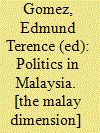

|
|
|
|
|
| Publication |
London, Routledge, 2007.
|
| Description |
ix, 160p.
|
| Standard Number |
0415425514
|
|
|
|
|
|
|
|
|
|
|
|
Copies: C:1/I:0,R:0,Q:0
Circulation
| Accession# | Call# | Current Location | Status | Policy | Location |
| 052544 | 324.09595/GOM 052544 | Main | On Shelf | General | |
|
|
|
|
| 11 |
ID:
188736


|
|
|
|
|
| Summary/Abstract |
This study focuses on state–state relations for business, a phenomenon shaped by how local power elites (LPEs), in this case, in Malaysia, collaborate with transnational corporate elites (TCEs), in this case, from China, to implement infrastructure projects linked to the latter's Belt and Road Initiative (BRI). These LPE-TCE links, which have led to the creation of novel forms of state–business relations (SBRs), offer interesting theoretical insights for SBR-related studies. This article builds on the conventional wisdom of homogenised SBRs as usually driven by bureaucrats by indicating that, in practice, state–business ties are extremely heterogeneous, with the capture of key institutions by influential LPEs. A conceptual framework explains theoretically how state–state relations, forged by two countries, both led by dominant parties that control their respective enterprises, have contributed to unique SBRs created to undertake BRI projects, driven by LPE-TCE links. Case studies of three BRI projects in Malaysia provide insights into how disparate forms of SBR-based institutional architecture function, not only at the federal level, but also in different states, involving enterprises from China. Diverse types of power relationships have emerged in these joint ventures, encompassing different LPEs, contributing to the creation of dissimilar SBRs. These LPEs have turned effective SBRs, fashioned to implement BRI projects, into economic endeavours that feature rent-seeking behaviour.
|
|
|
|
|
|
|
|
|
|
|
|
|
|
|
|
|
|
|
|
|